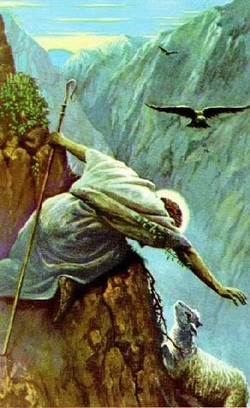The Three Lost Parables ~ Luke 15

"And he told this parable to them, saying...." (Luke 15.3)
The parable of the prodigal son comes as the third in a series of Jesus' parables about people responding to the loss of something precious--the Shepherd and the Lost Sheep, the Woman and the Lost Coin, and the Father and the Lost Son. Although the parable of the lost son is the most complex of the three, both literarily and theologically, it can only be fully understood by reading it in the light of the others. This is all the more true from if we view the three parables from the perspective of Jesus. He viewed these three parables as one parable--as it says in Luke 15.3, "and he told this parable to them, saying...." So as part of our growing understanding of the prodigal son, we need to compare and contrast it with its companion parables. What narrative elements do the parables have in common? What are their common themes? How does the parable of the lost son move beyond the other two in narrative and theological complexity?
The books by Kenneth Bailey inspired the outlines below.
Luke 15.4-7 – The Shepherd and the Lost Sheep
A certain man from among you MAN YOU
having a hundred sheep 100 WORTH/WEALTH
and having lost one of them, LOST 1
does he not abandon the ninety nine in the wilderness ABANDON 99 WILDERNESS
and go after the lost one until he finds it? LOST FIND
And having found it, he puts it on his shoulders, rejoicing, FOUND JOY
and having gone into the house, he calls together HOUSE CALL
his friends and family, saying to them, FRIENDS/FAMILY
Rejoice with me, JOY
because I found my sheep, the lost one. FOUND LOST
I say to you that in the same way there is more joy in heaven JOY
over one sinner repenting SINNER 1 REPENTANCE
than over ninety nine righteous who have no need of repentance. RIGHTEOUS 99 NO REPENTANCE
Luke 15.8-10 – Lost Coin
A certain woman, WOMAN
having ten drachmas, 10 WORTH/WEALTH
if she loses one drachma, LOST 1
does she not light a lamp and scour the house HOUSE
and seek carefully until she finds it? SEEK FIND
And having found it, FOUND
she calls together CALL
her woman friends and family, saying, FRIENDS/FAMILY
Rejoice with me, JOY
because I found the drachma, which I lost. FOUND LOST
In the same way, I say to you, there will be joy before the angels of God JOY
over one sinner repenting. SINNER 1 REPENTANCE
Compare and contrast...
...the numbers in the lost sheep and lost coin.
...their numbers with the lost son.
...the narrative flow of the lost sheep and lost coin.
...their narrative flow with the lost son.
...the characters of the lost sheep and lost coin.
...their characters with the lost son.
...the key terms/concepts of the lost sheep and lost coin.
...their key terms/concepts with the lost son.
For whom does the Man/Woman/Father stand?
For whom does the "lost" in each parable stand?
In conclusion, the parable of the lost sheep and the parable of the lost coin...
...are the same parable.
...have the same audience.
...revolve around the same crisis (something is lost).
...demand the same solution (a price must be made, a sacrifice must be made).
...lead to the same ending (celebration).
What are the main similarities and differences among the three versions of the one parable?
